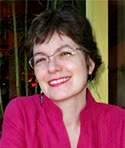I went to a play last night.
Got out of work at 6. Cut though SoHo and the Village while the golden hour threw sky onto west facing windows. Reflections of cloud and brick bouncing onto the glass of other buildings. Sunset, cloud, edifice. A whole recursive cityscape.
I was listening to dance music on my old iPod that gets me walking fast, but not so fast I wasn't noting all the places that weren't. I last worked down here 15 years ago. Elephant and Castle wasn't there. Neither was Anglers and Writers. And then I was cutting through NYU and here what wasn't, goes further back. My mom used to take me to all her college haunts when we visited NYC. Sutters was gone long ago but I still remember the shock of eating my first eclaire, the creamy with all those alternating layers of crisp...
But to really go back, try seeing what can be done with Medea. The Dutch theatre group, Drood Paard (Dead Horse), at PS122, did a modern adaption that was unlike anything I've ever seen. No masks, no linear narrative. Just three members of the chorus restraining themselves from "acting" and commenting on what they cannot do as bystanders. The parallels to politics--2007-- were there but restrained as well. Surprisingly, much of the dialogue was borrowed from Pop lyrics. Even obscure lyrics. Beetles to Punk garage bands...I'm sure I missed a lot of them. But somehow it all worked, even with their accents--obla dee, oblah dah, life goes on. Medea emerges as dangerous narcissistic priestess and not mother of the year. But we knew that. Love, greed, treachery, promises, jealousy, bribes, and retribution. Murder of innocents. Jason is the shallow kind of guy that always has one good reason to leave his woman or overthrow a king. He wants. Shiny, shiny.
Less successful, my group felt, were the slide shows that divided the play. I was reminded of post modern poems that indulge in ekphrastic non-linear journeys...unless you can do it justice, don't do it. The slide shows weren't boring, but they just could have been so much more. They didn't play with visual language the way the dialog did.
My friend G. and I are going to start a writing group. I'm going write a 10 minute play. An exercise. At the very least, it'll help me to write better dialogue or dramatic monologues in my poems. It is so easy to get insular. The job. The things I am used to doing. Drood Paard's Medea reminds me that experimental theater really does take risks. And without risks, art gets tame.
I loved how the original passions and ideas of the play emerged despite all the stagecraft, actors, props, and sets that weren't there.
Friday, September 28, 2007
Subscribe to:
Post Comments (Atom)







4 comments:
Congratulations, Claudia! Well spoken, well written and well done. More please.
Your experience reminded me of a seminal theater experience in my life...as a teenager going to see macbeth at small theater i could swear was called Courtyard....you went through the first floor of a hell's kitchen brownstone to the back into a small almost blackbox theater (didnt know that term then, back around 1968)....the stage was a simple black backdrop and all the actors stepped on for their parts dressed in black with spotlit heads ghostly as they pierced you with their gaze and portrayals....the head of macbeth on a stake lit on par with the actors is still etched across some neural passages........for me it was the image of the story impressed upon silly putty and stretched to its limit...of course the silly putty of your brain is infinitely elastic but it took a couple more years of going to adventurous theater to figure that out...so whether the theater experience goes for the ekphrastic or the ectoplasmic, if you end up really thinking about it afterwards then you know that the play was truly the thing. Good luck with your "thing."
Well put Len. You so vividly evoke your experience of the play. And yes, it is sticking with me. Thanks.
I like the description of drawing with charcoal vs. more technological means - an artist is more than her tools, but they still count. Good to see you blogging, Claudia, and looking forward to more.
Post a Comment